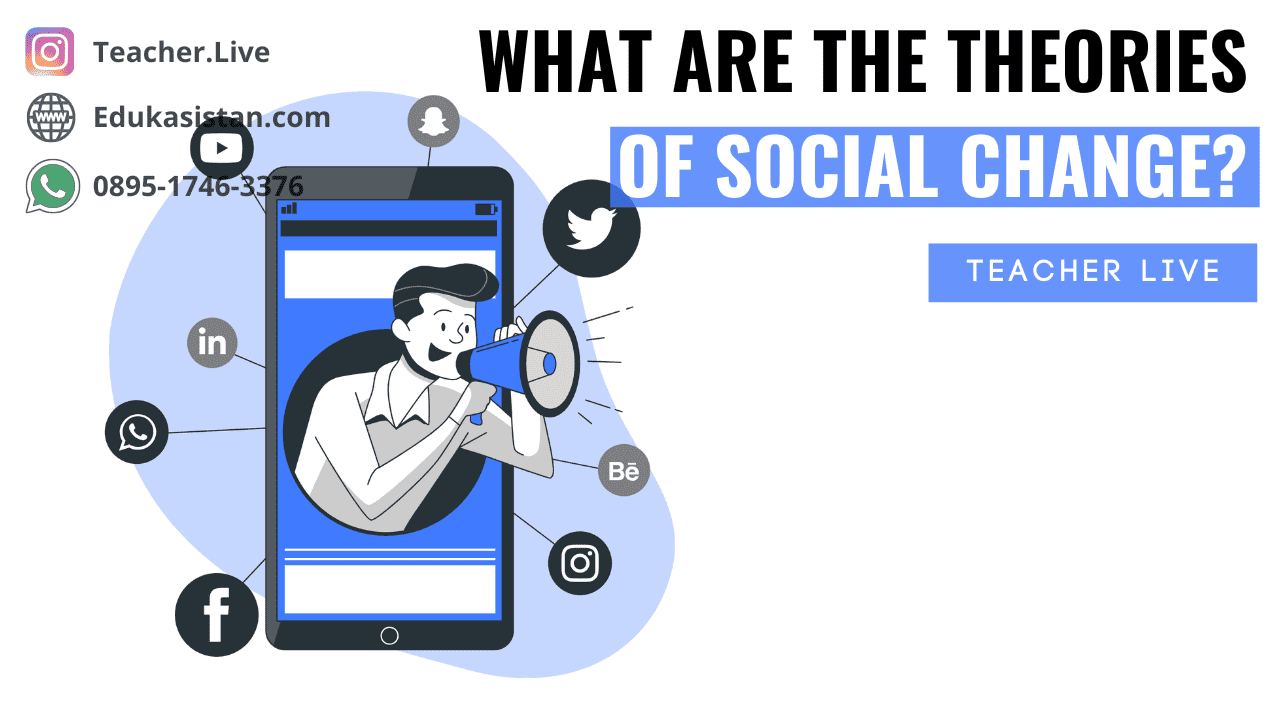What are the theories of social change?
Edukasistan.com - Hello everyone! Understanding social change is crucial in our daily lives. Social change is a phenomenon occurring in our society every day, and understanding it helps us comprehend how the world changes and evolves.
Social change can occur in various aspects of life, such as culture, economy, politics, and technology. The definition of social change is the transformation in the structure, functions, and values of society. Theories explaining social change include evolution, conflict, and functionalism theories.
Understanding social change in daily life is essential because it helps us adapt to changes around us and better understand society and the world around us. Therefore, studying social change is essential for every individual to face challenges and changes in the future.
In this article, I will discuss various aspects of social change, including its definition, theories explaining social change, and the importance of understanding it in daily life.
- Social change involves societal transformation involving values, norms, and behaviors.
- Evolution, conflict, functionalist, and cyclical theories are critical theories of social change.
- Evolution theory emphasizes the influence of technology and innovation in social change.
- Conflict theory focuses on conflicts between social groups as a driver of social change.
- Functionalist theory emphasizes the importance of social functions in maintaining societal stability.
Definition of Social Change
 |
| What are the theories of social change? |
Social change can be defined as a transformation in society's structure, culture, and values over time. There are various types of social change, including gradual and rapid changes. Gradual change occurs slowly over a long period, while rapid change happens quickly in a short time.
Moreover, there is a distinction between intentional and unintentional social change. Individuals or groups deliberately enact intentional social change to achieve specific goals, like social movements or political revolutions. On the other hand, unintentional social change occurs without prior intent or planning, like changes resulting from technological advancement or demographic shifts.
Theories of Social Change
Four main theories explain social change: Evaluation Theory, Conflict Theory, Functionalist Theory, and Cyclical Theory. These theories offer different perspectives on how and why social change happens.
Several theories explain social change:
1. Evaluation Theory
Firstly, Evaluation Theory explains that social change results from people evaluating their current situation and seeking improvements. I have personally experienced how this theory applies in daily life. When dissatisfied with my job, I evaluated my situation and looked for a more satisfying job. This process is an example of how individual evaluation can trigger social change.
2. Conflict Theory
Secondly, conflict theory explains that social change results from interest conflicts and power struggles among different societal groups. I have personally experienced how interest conflicts can trigger social change.
During my university days, student protests against perceived unfair campus policies eventually forced the campus authorities to change their policies, a real-life example of how conflict can trigger social change.
3. Functionalist Theory
Thirdly, functionalist theory explains that social change results from adapting to new needs and challenges. For instance, when new technology is introduced, society must adapt to these changes and develop new ways to interact and work.
I have personally experienced how technological changes affect our daily lives. When the internet became popular, I had to learn to use it for information searching and communication. This is a real-life example of how technological change affects our ways of living.
4. Cyclical Theory
Lastly, cyclical theory explains that social change results from natural societal cycles and patterns. For example, economic cycles consist of periods of economic growth followed by recessions. I have personally experienced how economic cycles can affect our lives.
During economic booms, many people get jobs and income increases. However, during recessions, many lose jobs, and incomes decrease. This is a real-life example of how economic cycles can affect our lives.
Conclusion
Social change helps us understand how the world changes and evolves. Social change, which encompasses aspects like culture, economy, politics, and technology, often occurs around us daily. Being aware of this enables us to adapt.
This article has discussed various aspects of social change, including its definition, theories explaining it, and the importance of understanding it in daily life. Understanding social change is essential as it helps us understand how the world changes and evolves.
By understanding social change, we can be better prepared for future changes and contribute to positive societal change.
I encourage readers to continue learning about social change and its implications in their lives and communities. By understanding social change, we can become active agents of change and play a role in creating a better society. So, let us continue learning and contributing to positive societal change.
Frequently Asked Questions (FAQs)
1. What is Social Change Theory?
Social Change Theory is a collection of concepts and principles used to explain how societies change over time.
2. What are the Theories of Social Change?
Some existing Theories of Social Change include Social Evolution Theory, Functionalism Theory, Conflict Theory, Symbolic Interactionism Theory, and World-System Theory.
3. What is Social Evolution Theory?
Social Evolution Theory suggests that societies change gradually from more straightforward to more complex forms.
4. What is Functionalism Theory?
Functionalism Theory states that society is a system of various interrelated parts functioning to maintain social balance.
5. What is Conflict Theory?
Conflict Theory suggests social change occurs due to conflicts between groups with different interests.
6. What is Symbolic Interactionism Theory?
Symbolic Interactionism Theory states that social change occurs due to interactions between individuals and their social environment.
7. What is World-System Theory?
World-System Theory suggests that social change occurs due to interactions among countries worldwide that are interconnected and influence each other.

